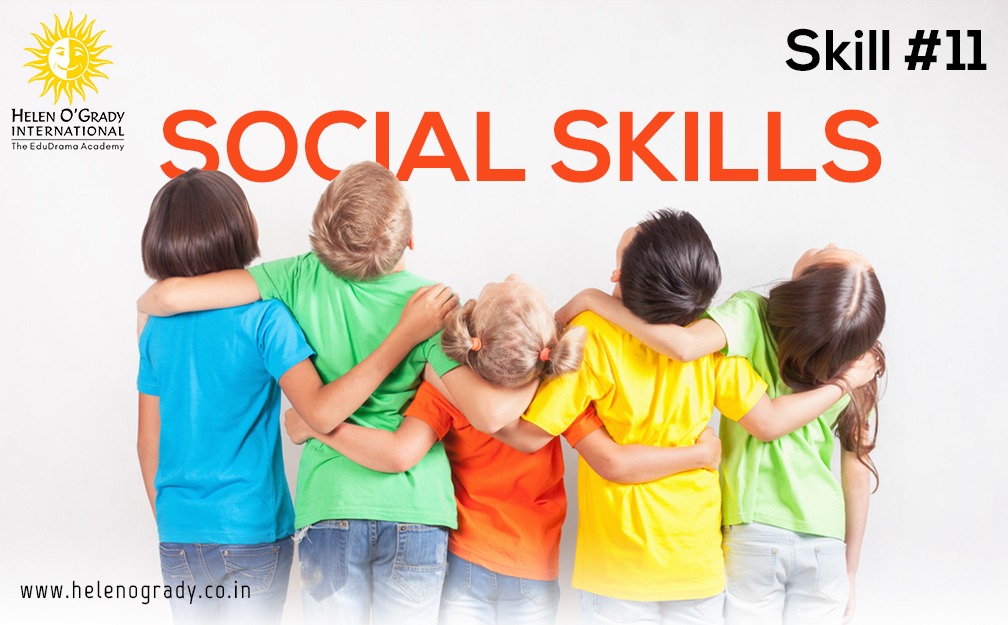Blog

25th February 2019
Skill #11 Social Skills
What are social skills?
Social skills are the skills we use to communicate and interact with each other, both verbally and non-verbally, through gestures, body language and our personal appearance. Social skills are ways of dealing with others that create healthy and positive interactions. Children who have social skills can communicate clearly, calmly, and respectfully. They show consideration for the feelings and interests of their peers. They take responsibility for their actions, are able to control themselves, and are able to assert themselves when needed. Children learn social skills through experiences with peers, examples and instructions from their parents, and time with adults. Developing social skills in children prepares them for a lifetime of healthier interactions in all aspects of life. Social skills are an integral part of functioning in society. Displaying good manners, communicating effectively with others, being considerate of the feelings of others and expressing personal needs are all important components of solid social skills.
Why is it necessary?
It is vital for children to use social skills because they are the route to creating and developing relationships. They are needed for enriching social experiences, and they lessen the chance for negative interactions. Being the building blocks for friendships, social skills give children the chance to learn from their peers and learn how to be considerate with those they meet in the future. By having a positive impact on life experiences, social skills also give children a sense of confidence and mastery over their environment. We encourage children to communicate so they can tell what they’re feeling and thinking. We listen and respond in a sensitive way to all kinds of things – not just nice things or good news, but also anger, embarrassment, sadness and fear. Focusing on body language and tone as well as words so we can really understand what children are saying, taking into account what children of different ages can understand and how long they can pay attention in a conversation. Communicating well with children improves bond with them, and encourages them to listen to you.
We are equipping them straight away with the skills to build a successful future. Register today: 9321333323 | admin@helenogrady.co.in
10 tips to build social skills
- Follow Their Interests: Enjoying others will come more naturally when a child is doing something they are genuinely interested in. Whether it's participating in a favorite sport, playing an instrument they like or being part of a club they're interested in, this is the first step toward building social skills.
- Ask Questions: Sometimes when children get nervous or a conversation lags, they may become more introverted and ultimately struggle in future social situations.
- Practice Role Playing: Pretend-play, with both younger and older children, is a great way for kids to actively practice their social skills. Have your child pretend to be the person they have difficulty talking to or getting along with. This will give you an idea of what this person is like, or at least how your child perceives this particular person.
- Teach Empathy: If children have a better understanding of how others feel, they are much more likely to feel connected to other people and form positive bonds.
- Know Your Child's Limits: Some children are simply more social than others. A child who is shy and introverted should not be expected to interact in the same way as a child who is naturally outgoing. Some children are comfortable in large settings, while others find it easier to relate to their peers when in smaller groups. It's also important to understand a child's time limits.
- Be a Good Role Model: It's important to be consciously aware of how you interact with others when your child is watching. Are you asking questions of others and then taking the time to actively listen? Do you show genuine empathy for friends and family in your life? Children are constantly watching the adults in their lives.
- Encourage eye-contact: When talking to somebody, encourage your children to look into their eyes and talk for effective communication and to build confidence.
- Make them communicate: Verbal or non-verbal, your children should learn to express, interact, and respond to social stimulus. Help your children learn appropriate greetings and responses.
- Give them the environment: A lonely child may have difficulty in interacting with the world. Give your children good company, exposure, and chances to interact with different types of people. Kids with social skill deficits often have trouble reading expressions and interacting socially.
- Prepare them for higher social skills: A child who can communicate and express himself/herself fearlessly is armed to face the challenges when he/she grows up to tackle complex situations.
